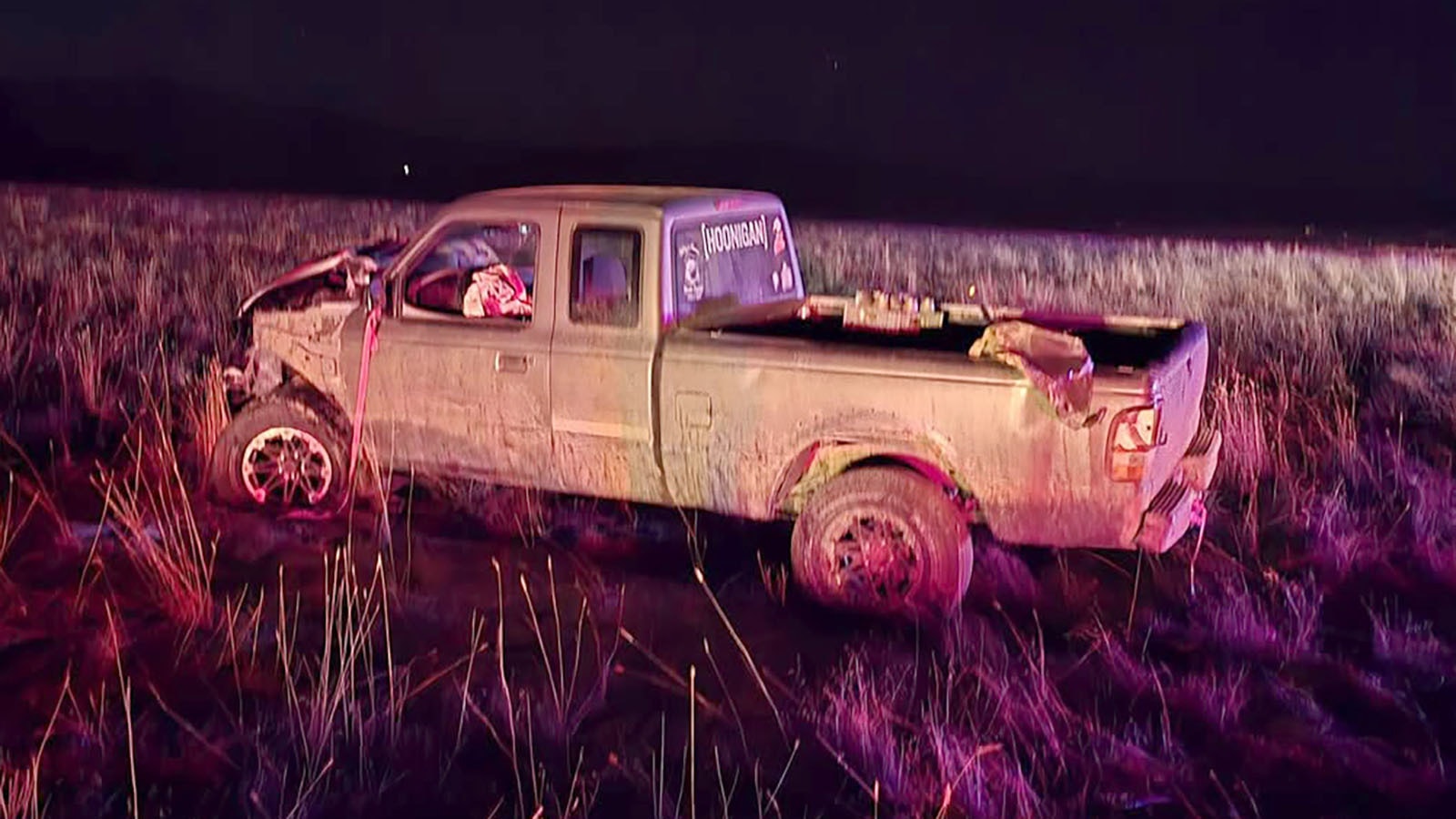Under Wyoming law, dogs are property.
The Wyoming Supreme Court on Wednesday declined to side with a family whose children tried and failed to save their three dogs as the dogs died in a trapper’s snares near Casper.
Robert Cardenas and his wife Ashley Cardenas, along with their two children, Savannah and Braylon, sued Sigiel J. Swanson, the trapper who set the snares.
The Cardenas family’s lawsuit asked for damages from Swanson for inflicted emotional distress on the children. But the high court Wednesday declined to recognize this claim, saying even genuine emotional distress doesn’t warrant damages from negligent property destruction, under state law.
A Harrowing Hunt
The Cardenas family owned three St. Bernard dogs at their home in the foothills of Casper Mountain, according to the court’s Wednesday decision. The dogs — Brooklyn, Barkley and Jax — ran unleashed on state land next to the family home, but would always return before dark.
On the afternoon of Nov. 29, 2014, the dogs went outside to run. Barkley and Jax came home that night but Brooklyn didn’t, says the order.
The family searched for Brooklyn for days and couldn’t find her.
‘He’s Dead’
While their parents were at work Dec. 2, Savannah and Braylon kept searching, taking Jax and Barkley along for help. As they walked along a ridgeline on state land, Barkley ran ahead and down a draw, but didn’t come back.
The children followed the dog’s path, soon finding him lying in brush, caught in a snare with an apparent broken neck. They tried to free the dog from the snare. Braylon injured his hands trying to save his dog.
Savannah, “highly emotional,” phoned her mother and declared, “He’s dead.”
The mother thought something had happened to her son.
“Fortunately within a short time she understood that Braylon was alright, though Barkley was not,” reads the Cardenas family’s appellant brief.
‘It Felt Like Forever’
During all this struggle, Jax had gotten into a different snare.
The children tried loosing Jax’s snare but that dog also died.
“He had this … long wire attached to him, and he was trying to, like, back up and push himself away from it, and he was just making it tighter,” Savannah Cardenas would later recall at her deposition. “And I tried to dig into his neck to try to loosen it, but the snare was so tight that it had already started to cut his skin and he was bleeding.”
It only took a few minutes, said Savannah Cardenas, but “it felt like forever.”
Meanwhile, both parents left work to look for the children. When they arrived at the scene, Braylon was “rolled up in a ball, crying,” while Savannah cried and apologized over and over for failing to save the dogs, says the order.
“The two children were utterly distraught,” it adds.
A few minutes later, a neighbor called to say he’d found the first dog ,Brooklyn, also caught and killed in a snare.
“The snare on Brooklyn surrounded her snout,” says the Cardenas family’s brief. “It was obvious that Brooklyn had died a very slow and unpleasant death.”
Negligence And Emotional Distress
Swanson, a trapper, does not dispute that he set the snares, according to the high court’s order.
The Cardenas family filed a suit against Swanson asserting claims of “negligence, willful and wanton misconduct, violation of statutes, infliction of emotional distress” and civil rights violations.
Swanson asked the Natrona County District Court to dismiss the lawsuit. The court dismissed part of the suit, dismissing the Cardenas family’s claims of negligent and intentional infliction of emotional distress, and the alleged civil rights violations.
The family’s misconduct and property damage claims remained, along with emotional distress charges pertaining to those.
Swanson then asked the court to judge the case in his favor, saying the remaining claims didn’t work under the law.
The court accommodated Swanson, mostly.
It found that his trapping wasn’t willful and wanton under the law, and the Cardenas family couldn’t recover damages for its emotional distress claims.
All that remained was Braylon’s personal injury claim from hurting his hands on the snares.
The court told the family members they could appeal the dismissal of their emotional distress claims. So, they appealed to the Wyoming Supreme court in September 2022.
Emotional Distress Is Payable Sometimes
The Cardenas family argued that the two children should be able to recover damages for emotional distress from watching their dogs die, because of Swanson’s alleged negligence.
But Wyoming courts usually only allow such claims when the emotional injury was linked to a physical injury or the prospect of one.
Other than that, people can wage purely emotional-distress claims when there are intentional torts, like false imprisonment or malicious prosecution, or the violation of certain constitutional rights or a breach of good faith and fair dealing covenants.
In a 1986 case, the state’s high court ruled that defendants who inflict emotional distress through negligence may have to pay damages if someone observed serious bodily harm in a family member.
Not The Same As Switched At Birth
The Cardenas family said the 2003 case of Larsen vs. Banner Health should work to their benefit, where a court allowed emotional-damages recovery for negligent actions in the case of a mother and daughter separated for 43 years after hospital staff switched two newborns at birth.
But the Wyoming Supreme Court disagreed, saying there was a contractual relationship between the mother and Banner Health, and that messing up that contractual relationship by switching newborns carried “deeply emotional responses” with it.
The hospital, said the court, had a duty to avoid causing emotional harm. It declined to make the same statement about Swanson, and noted that there was no contractual relationship of any kind between Swanson and the Cardenas family.
Dogs Are Property
“Under Wyoming law, dogs are property,” the ruling continues. “While we do not question the Cardenas family’s heartache over the deaths of their dogs (an earlier case) precludes recovery for emotional distress damages under these facts.”
That earlier case involved a family that tried to sue a plumber in the early 2000s for flooding their home, leading to the destruction of cherished personal possessions. The court in that case also denied recovery for emotional damage.
It was right for the Natrona County District Court to side with Swanson on those claims, the order adds.
Look Past The Definitions
But the Cardenas family asked the court to expand its interpretation of state law to include dogs in a property-plus category of animate property, and make their loss recoverable as an emotional injury.
The family cited an article contending that some pet owners have strong emotional attachments to their pets and there’s evidence of “psychological benefit” from recognizing them as more than property.
But the high court wouldn’t bend the legal definitions to accommodate these arguments.
“We decline to do so,” reads the order. “This is an argument best made to the Legislature, and we decline to expand the reach of emotional damages to property inanimate or animate.”
These Hurt Hands
No one in the lawsuit disputes that Braylon “incurred minor injuries to his hands” when trying to free his dogs, says the order. Savannah also had physical impacts from trying to free the dogs, the family contends.
But these minor physical injuries also don’t merit an emotional distress recovery, says the order, because the family’s emotional distress claim still are rooted in the loss of their dogs — aka property — not trauma from injuries.
What About The State?
In addition to Swanson, the Cardenas family initially sued Wyoming Game and Fish and the state itself, alleging the state misrepresented facts surrounding Swanson’s trapping actions.
The court dismissed the family’s claims against the state. While the Cardenas family called an order relating to the dismissal “odd,” it did not appeal that issue to the high court.
Clair McFarland can be reached at clair@cowboystatedaily.com.





